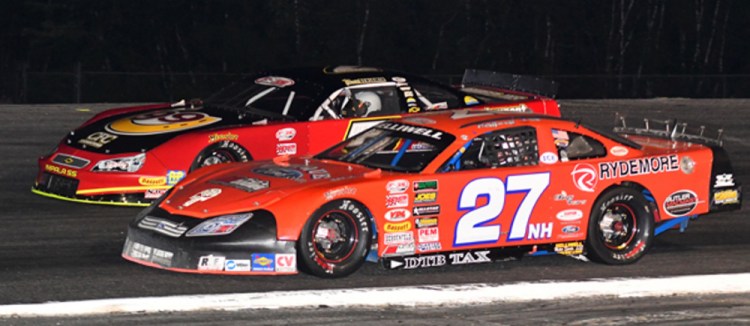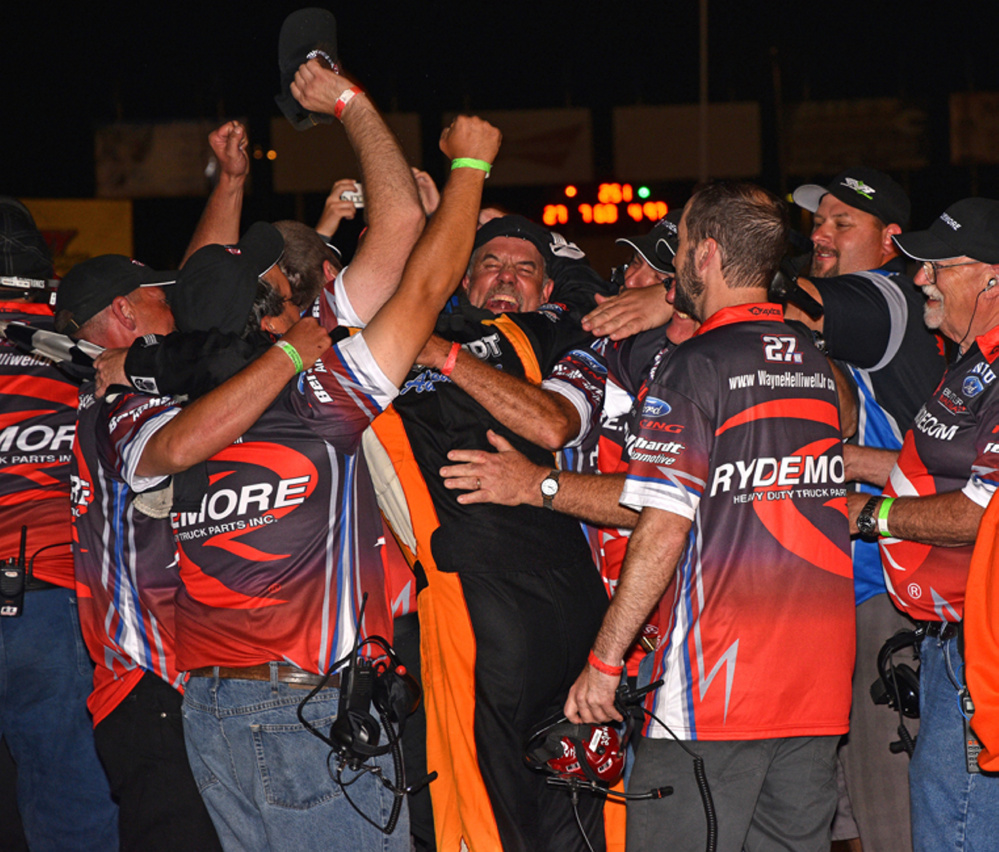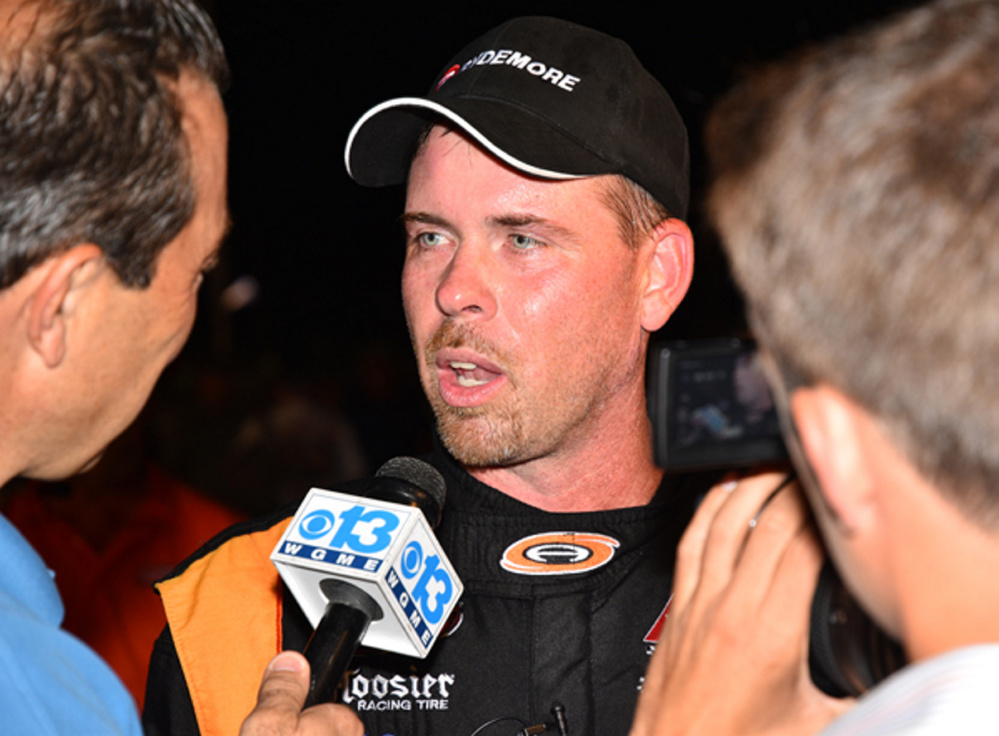OXFORD — Wayne Helliwell Jr. stepped out of the Oxford Plains Speedway press box into darkness.
The grandstand lights were turned off. His car and crew were gone. Pit road was a ghost town, save for scraps of litter fluttering in the breeze. There wasn’t even a golf cart waiting to shuttle the Oxford 250 champion to the pit area beyond the speedway’s backstretch.
The 39-year-old driver from Pelham, New Hampshire, had just won the most prestigious race of his career, yet what should have been one of the biggest weekends of his life was simply a doorway into an unrelenting winter that nearly threatened his life.
It was, as Charles Dickens famously penned more than 150 years ago, the best of times and the worst of times. Literally.
“That’s exactly how it was,” Helliwell said this week as he prepared to defend his Oxford 250 title in the 44th edition of the race this Sunday. “It was such a double-edged sword. Even as far as my family, I didn’t tell anybody what was going on.”
Multiple sclerosis — a disabling disease of the central nervous system — had resurfaced.
Fourteen years after first being diagnosed, Helliwell was dealing with a significant flare-up of the multiple sclerosis he’d been effectively managing throughout most of his adult life. He was dizzy, nauseous and extremely fatigued, all while competing in the most grueling three-day weekend on the entire northeast racing schedule.
COPING WITH ILLNESS
In 2002, Helliwell had been racing at Canaan (New Hampshire) Speedway when he began feeling dizzy in the car. It got so bad that he made the choice to pull off the track and retire from the race less than a third of the way through the feature event.
“It was so bad that when I was on the straightaway at one point, I thought I was in the middle of the corner,” Helliwell recalled. “I figured it was dehydration, you know, drinking too much soda, not enough water, all of that kind of stuff. Then I noticed that my vision wasn’t as good either. Things just weren’t as clear, so I went to the eye doctor.”
The optometrist didn’t have encouraging news. Helliwell was losing vision in his left eye — “He told me, ‘Your optic nerve is dying.'” Progressive optic nerve damage is a precursor to multiple sclerosis. At 25 years old, Helliwell was urged to meet with a neurologist, who diagnosed him with relapsing-remitting multiple sclerosis.
“We go through the medication process, and they give me a medication they think will suit me,” said Helliwell, who has three daughters with his wife, Jill. “You take it once a week, and it will make you sick for two or three days, so I’d take it on Sunday nights, I’d get through the rest of the week and then I’d be fine for racing. I did that for a number of years.”
Helliwell admits that he then made a bad decision. He started to notice that his MS symptoms had subsided and that the medication was making him feel worse the longer he took it. So he weaned himself off the medication, something he later regretted.
For years, he took nothing and felt fine, while his racing career took off. He won multiple track championships at his home track of Lee USA Speedway and Canaan Speedway, American-Canadian Tour Late Model championships, a Late Model race at New Hampshire Motor Speedway and a pair of Pro All Stars Series races — including the crown jewel Oxford 250 last summer, something he and crew chief Bruce Bernhardt had spent the better part of two years focusing their efforts toward.
Helliwell acknowledges that the multiple sclerosis had flared up for three months heading into the Oxford 250 last August — and nobody really knew it.
“Wayne and I, we’re just the type of people, we deal with things,” Bernhardt said Tuesday while working at the auto repair shop he owns. “Whatever comes along, you deal with it. You don’t try to make anything into something that it isn’t.”
As it typically is in August, Oxford 250 weekend was a hot one last year. Helliwell took naps in the team’s hauler during breaks between practices. He was watching the ACT race Saturday night in the stands with a friend when he suggested he’d like to leave early.
That raised a red flag, but the Oxford 250 isn’t a race that a driver is simply willing to walk way from. Bernhardt and Helliwell, two New Hampshire natives, say the race remains special.
Bernhardt got his start in racing with the Dion brothers — his No. 27 EKeys 4 Cars Ford carries the same signature orange paint scheme that Dave Dion drove to three Oxford 250 wins as one of the dominant drivers of a generation — and success in the Oxford 250 is part of the Dion legacy.
“They’d take a month to prepare for it,” Bernhardt said. “Over the last two years, that’s what we’ve done. There’s a whole bunch of stuff — the testing is big. If you can go there knowing you have a good car, then you’re looking for half-tenths on the stopwatch instead of half a second.
“To me, it’s the heritage of it. Dave Dion won it, Ralph Nason, all those people that have won this thing. And you even look at the people that have tried to win this, too.”
Despite feeling tired and beaten down by the heat, Helliwell held off two-time Oxford 250 winner Travis Benjamin to win.
And then, just as soon as he was done with his media obligations in the press box atop the grandstands at Oxford Plains Speedway that night, it was over.
Helliwell didn’t race again for almost 10 months.
“I couldn’t leave my bedroom,” Helliwell, now 40, said about the weeks after the Oxford 250 win, as symptoms only worsened and he was unable to race for the remainder of 2016. “I couldn’t turn lights on. Any type of lighting made me sick to my stomach. Dizzy. Nauseous. Spins. It was just like that, 24-7, every day.”
After years of feeling “perfectly fine,” the relapsing-remitting multiple sclerosis had returned, and worse than ever. It was a long winter filled with emergency room visits, neurologists and trying to get the right medication he needed.
September turned into November, which turned into December, which turned into 2017. Even though he was sick and unsure of what the outcome would yield, one thing helped keep him going, helped him stay positive.
“When I was sick, Bruce and I were still talking like nothing was wrong,” Helliwell said. “We were ordering a new trailer, new parts to build a new race car, and when I was feeling good I’d drive to the garage and we’d build a new car.
“It felt good to do that. There were a lot of people talking like I would never get back in a race car.”
Those people, whoever they were, couldn’t have been more wrong.
BACK ON TRACK
At the end of June, though still not feeling quite 100 percent, Helliwell finished third in a 50-lap feature event for Oxford Plains Speedway’s weekly Super Late Model division. One week later, he finished second in a PASS Open 100 at the track.
Though he still has what he calls “off days,” when he’s fatigued, and summer heat can be particularly tough on people with multiple sclerosis, Helliwell is ready for this weekend’s Oxford 250. Though he and Bernhardt built a new car just for this race, it won’t be seeing the track.
“We’ve definitely opted to go back to the old car,” Helliwell said, noting that he’s added an air-conditioning system in the car this summer to help him fight off the heat. “We just haven’t worked enough of the bugs out of the new car, and I haven’t liked it enough to bring it out for such a big day like this one is.”
It’s a day so big that he hopes he can celebrate again, this time knowing that he’ll be back to the track before the season is out.
“Going into the weekend, I do have in the back of my mind — do I get sick at some point? What if I wake up and don’t feel well? The old Wayne will never be,” Helliwell said. “But I can be thankful enough that I have a car owner and sponsors that understand that and are behind me either way.”
Travis Barrett — 621-5621
tbarrett@centralmaine.com
Twitter: @TBarrettGWC
Send questions/comments to the editors.






Comments are no longer available on this story